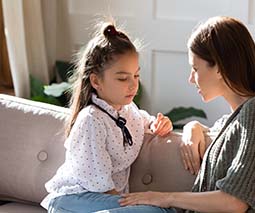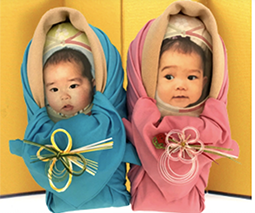Should we always tell our kids the truth?

Naturally, as parents, we strive to be as honest as we possibly can with our children. However, are there moments when it’s appropriate to tell them a little lie? Some say never and some have exceptions to the rule, but it’s interesting to see where you draw a line in the sand.
Is it ever okay to lie?
Nate Cooke, owner and coach of Gritboxx, came in to talk to Babyology podcast Feed Play Love about how we should always be truthful with our children, no matter how uncomfortable it might be. “Be as honest as you possibly can because our kids learn from us every day,” says Nate. “If they get used to mum and dad telling fibs, they’ll grow up thinking that it’s okay to do it.”
For Jane, a Sydney mother of two, honesty with her kids has always been the best policy. “I want them to know that they can trust my word and trust me,” she says. “And hopefully I model for them how important it is to be a good person and a trustworthy one.” Thinking back, Jane remembers a moment she had while taking one child to have vaccination shots when this became crystal clear. “We were holding her on the table and I was coo-ing to her telling her it was all okay,” she says. “They pushed the needles in and I’ll never forget the look on her face; this look of surprise, which turned to hurt and outrage, and she looked me straight in the eye and I had this horrible feeling: I just lied to her and she knows it.”
Listen to Nate Cooke of Feed Play Love:
What about curly questions?
Kids have never-ending questions, and for Nate, there’s only one approach. “When it comes to kids asking questions, as uncomfortable as it is, it’s a teachable moment for parents,” he says. “If we raise our kids and deny them of the ability to feel uncomfortable, awkward or vulnerable to something, I think we’re denying them a primal urge to be curious, find out and understand.”
What if your pet dies?
As sad as it is, when a family pet dies, Nate believes this isn’t the time to replace the goldfish and pretend everything’s fine. Having had three pets die, he found that the truth helped his kids to understand what was going on, particularly when pets had to be put down. “Telling the truth about what was going on, gave them a life lesson, as hard as it was,” he says.
What about Santa?
I personally loved the magic and excitement of Santa and believed for as long as I could. At some point, the truth became clear, but there was no shocking moment, nor anger at my parents for lying to me. Now I’m a parent, Santa is back, and my children love it all as much as I did. I don’t feel dishonest for keeping the magic alive, but for others, it’s very much a lie.
Jane initially encouraged the idea of Santa and other childhood myths such as the Easter Bunny and Tooth Fairy, but eventually decided to come clean. “At first we played along with these, but my husband always felt uncomfortable about it and didn’t like participating in the charade,” says Jane. “I was always careful in answering their questions to not properly lie, and instead evade what they said. But a few years of that and it got to both of us: the fact that we always told our kids never to lie, and that we would never lie, and here we were lying to them about these things on a regular basis.”
According to Jared Piazza, lecturer in Moral Psychology, Lancaster University, there are pros and cons to both approaches with no evidence that children are harmed in either case. “What’s clear, though, is that parents shouldn’t be overly worried about the repercussions of believing in Santa – children are not completely credulous,” Jared reported to The Conversation. “In fact, children continually take stock of what those around them believe – and actively assess the uniformity of such beliefs to reach conclusions about the plausibility of various claims. As children’s casual reasoning develops (“Santa is too fat to fit down the chimney”), they eventually realise that he is not real, while understanding that other things they can’t actually see, for example, germs, are.”
Sibling rivalry
If you share a special treat or experience with one child, do you have to be completely honest with your other child when you get home? You know you’ll soon share an equally special moment with the other child, and sometimes the truth can be more trouble than it’s worth. “I think it’s important when you’ve got more than one, that kids have special times and moments,” says Nate. “And does that need to be shared with each one, just so they don’t feel left out? I don’t think so.”
For Jane, the problems arise when her daughters ask her to choose between them. “If they do a dance competition and want me to judge it, or both make an artwork and want me to say whose is best, I find it very difficult being honest in that situation,” she says. “It pains me to say that one is better than the other.”









